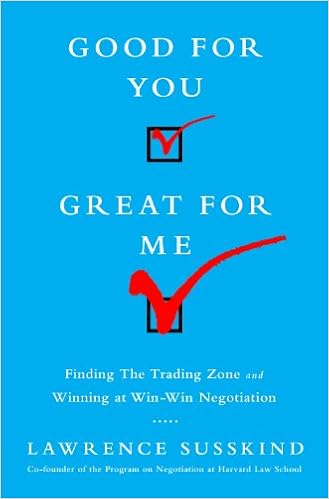One of my colleagues is quite upset that I have been talking about winning at win-win negotiation. He views the inclusion of this idea in the subtitle of my new book (Good for You, Great for Me: Finding the Trading Zone and Winning at Win-Win Negotiation, Public Affairs) as a betrayal. He's part of the "Getting to Yes" Club (as am I), and mistakenly thinks that Getting to Yes (Fisher, Ury and Patton) requires a commitment to negotiating in a purely cooperative way. That's wrong. The "principled approach" to negotiation introduced in Getting to Yes never assumed that both "sides" had to commit to purely cooperative behavior. Indeed, having known the authors for many years, I can assure you that they expected skilled negotiators to confront the inevitable tension between "creating and claiming value," that is, balancing the cooperative and competitive elements of every negotiation.
The key argument in my book is that a negotiator is likely to do better in a negotiation if he or she goes out of their way to make sure that their counterpart(s) achieve their most important interests -- while they achieve theirs. That doesn't mean, however, that everyone should split everything equally. Indeed, it's not at all clear that an even split is appropriate. I might bring more to a deal or agree to shoulder a greater share of the risk. If I do that, I should get a disproportionate share of the value we create. That's only fair. So, the question going into a negotiation is who will get the greater share of the value created AFTER both sides have meet their most important interests. I call that winning at win-win negotiation.
In the book, I describe six strategies for claiming value in a win-win context. Each assumes a sincere effort to help the other side meet their most important interests. Indeed, I argue that you should go out of your way to formulate agreements that create more value for the other side than they ever expected. Once basic interests are met, however, I think you can legitimately argue that since you did more to create a mutually advantageous agreement, you deserve a greater share of the total value created.
Over the last four decades, sophisticated negotiators have moved from win-lose (zero-sum) to win-win (all gain) negotiating strategies. Now, we have to convince the win-win crowd that there's nothing wrong with claiming a disproportionate share of the value they have helped to create (once basic interests have been met on all sides). There are ways to do this that won't spoil relationships. Do you know what's involved, or do you need to read Good for You, Great for Me?
The key argument in my book is that a negotiator is likely to do better in a negotiation if he or she goes out of their way to make sure that their counterpart(s) achieve their most important interests -- while they achieve theirs. That doesn't mean, however, that everyone should split everything equally. Indeed, it's not at all clear that an even split is appropriate. I might bring more to a deal or agree to shoulder a greater share of the risk. If I do that, I should get a disproportionate share of the value we create. That's only fair. So, the question going into a negotiation is who will get the greater share of the value created AFTER both sides have meet their most important interests. I call that winning at win-win negotiation.
In the book, I describe six strategies for claiming value in a win-win context. Each assumes a sincere effort to help the other side meet their most important interests. Indeed, I argue that you should go out of your way to formulate agreements that create more value for the other side than they ever expected. Once basic interests are met, however, I think you can legitimately argue that since you did more to create a mutually advantageous agreement, you deserve a greater share of the total value created.
Over the last four decades, sophisticated negotiators have moved from win-lose (zero-sum) to win-win (all gain) negotiating strategies. Now, we have to convince the win-win crowd that there's nothing wrong with claiming a disproportionate share of the value they have helped to create (once basic interests have been met on all sides). There are ways to do this that won't spoil relationships. Do you know what's involved, or do you need to read Good for You, Great for Me?





0 Comments:
Post a Comment